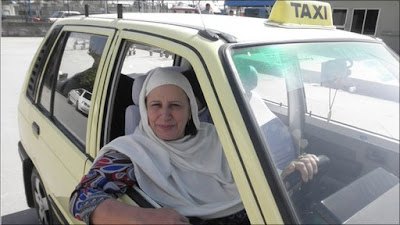
Sunday, January 22, 2012
AAFIA SIDDIQUI CONTRACTS CANCER IN US JAIL

Wednesday, January 18, 2012
SOPA, PIPA: What you need to know
Having trouble using Wikipedia today? That's because the popular crowd-sourced online encyclopedia is participating in an "Internet blackout" in protest of two controversial anti-piracy bills: The Stop Online Piracy Act (SOPA ) and its Senate companion, the Protect IP Act (PIPA ).
Pictures: Websites go dark to protest SOPA
The bills are intended to strengthen protections against copyright infringement and intellectual property theft, but Internet advocates say they would stifle expression on the World Wide Web. In essence, the legislation has pitted content providers -- like the music and film industries -- against Silicon Valley.
"It's not a battle of left versus right," said progressive activist Adam Green, whose organization Progressive Change Campaign Committee on Tuesday hosted a press conference with opponents of the bills. "Frankly, it's a battle of old versus new."
Here's a basic look at the actions taking place today and the legislation causing all the fuss.
What's going on today?
The popular link-sharing site Reddit got the ball rolling for today's 24-hour Internet blackout. In addition to Reddit and Wikipedia, other sites participating include BoingBoing, Mozilla, WordPress, TwitPic, MoveOn.org and the ICanHasCheezBurger network. Search giant Google is showing its solidarity with a protest doodle and message: "Tell Congress: Please don't censor the web," but the site planned no complete blackout.
Other sites -- like Facebook and Twitter -- oppose the legislation in question but aren't participating in today's blackout.
In addition to the Internet-based protests, some opponents are physically protesting on Wednesday outside of their congressional representatives' offices. Reddit co-founder Alexis Ohanian said in Tuesday's press conference it will "probably be the geekiest, most rational protest ever."

What does the legislation do?
There are already laws that protect copyrighted material, including the Digital Millennium Copyright Act (DMCA). But while the DMCA focuses on removing specific, unauthorized content from the Internet, SOPA and PIPA instead target the platform -- that is, the site hosting the unauthorized content.
The bills would give the Justice Department the power to go after foreign websites willfully committing or facilitating intellectual property theft -- "rogue" sites like The Pirate Bay. The government would be able to force U.S.-based companies, like Internet service providers, credit card companies and online advertisers, to cut off ties with those sites.
Why content providers want SOPA and PIPA
Content groups like the Motion Picture Association of America (MPAA), and business representatives like the U.S. Chamber of Commerce, argue that innovation and jobs in content-creating industries are threatened by growing Internet piracy. Overseas websites, they argue, are a safe haven for Internet pirates profiting off their content.
According to the Global Intellectual Property Center, which is part of the U.S. Chamber of Commerce, intellectual property-intensive sectors employ more than 19 million people in the U.S. and create $7.7 trillion in gross output. Foreign website operators currently outside the bounds of U.S. law; SOPA and PIPA would help quell illegitimate Internet activity.
In a statement , former Sen. Chris Dodd, who is now chairman and CEO of the MPAA, called the blackout day a "gimmick."
"It's a dangerous and troubling development when the platforms that serve as gateways to information intentionally skew the facts to incite their users in order to further their corporate interests," Dodd said.
CBS Corporation, which owns CBSNews.com, is a member of the Copyright Alliance -- an industry group representing content producers that supports SOPA and PIPA.
Why Internet companies oppose SOPA and PIPA
Internet companies and their investors would readily say that they're holding the "blackout" to protect their corporate interests -- and the entire burgeoning Internet-based economy.
"The success of Reddit... is one of the smaller examples of the success that has happened in our industry -- and will continue to unless bills like SOPA or PIPA become law," Ohanian said Tuesday.
Under the rules SOPA or PIPA would impose, Ohanian and others argue, start ups wouldn't be able to handle the costs that come with defending their sites against possible violations. Such sites would not be able to pay the large teams of lawyers that established sites like Google or Facebook can afford.
The legislation in question targets foreign companies whose primary purpose is to sell stolen or counterfeit goods -- but opponents say domestic companies could still be held liable for linking to their content. While sites like Reddit wouldn't have a legal duty to monitor their sites all the time, "you might have your pants sued off of you" if you don't, said Jayme White, staff director for the Senate Finance Subcommittee on international trade.
Brad Burnham, managing partner at the venture capital fund Union Square Ventures, said his company has avoided investing in companies related to the music industry because of the copyright risks -- but under the proposed legislation, that risk would hit just about any Internet company. SOPA and PIPA, he said, "takes the risk of frivolous litigation... to the entire Internet."
That should be a concern, Burnham said, when the Internet accounts for 21 percent of economic growth among developed nations, according to one study .
The impacts could go beyond the economy, some argue. Rebecca MacKinnon, a senior fellow at the nonpartisan New America Foundation, argues that if blogging platforms are motivated to monitor their content, that could have "a tremendous chilling effect on people tyring to conduct political discourse and trying to use content in a fair use context."
Where does the legislation stand?
Opponents of SOPA and PIPA celebrated when, earlier this month, authors of both bills decided to set aside the most controversial aspect of them -- language that would have let the Justice Department force Internet Service Providers to block the domains of suspected foreign "rogue" sites. Also, over the weekend, the White House suggested it wants to see modifications to the legislation.
The Senate is scheduled to hold a procedural vote on PIPA on January 24.
House Judiciary Committee Chairman Lamar Smith, R-Texas, who sponsored SOPA, said Tuesday he expects the committee to continue work on the House bill in February.
Rep. Darrell Issa, R-Calif., meanwhile, is opposed to the legislation and will today officially introduce an alternative -- the Online Protection and Enforcement of Digital Trade (OPEN) Act. Issa said Tuesday he expects his bill to have more co-sponsors than SOPA has in the House and that "once members of Congress see a viable alternative... I think we can get to a consensus."
The OPEN Act would make the International Trade Commission, rather than the Justice Department, responsible for policing U.S. connections to foreign rogue sites. Placing that responsibility in the hands of one entity, rather than the whole court system, would make the process more transparent, Issa argues.
Tuesday, January 17, 2012
Inside A $1.5 Million Cave House
Inside A $1.5 Million Cave House.

Locals refer to it as the Cave House and the nickname is apt. Sitting on 37 acres just outside of Bisbee, AZ, a mining town-turned-Baby Boomer retirement haven about 80 miles from Tucson, the Chulo Canyon Cave House is carved into an outcropping of granite boulder, extending more than 2,000-square feet into a desert grotto.



A BlackBerry handset is displayed in Washington.

TORONTO/SEOUL (Reuters) - Research In Motion is not onSamsung Electronics Co's immediate shopping list, but the ailing Blackberry maker may still be attractive to Asian smartphone makers looking to compete against Google's Android, the world's fastest growing mobile platform.
Samsung said on Wednesday it has no interest in buying RIM or licensing its operating system, refuting a tech blog report that Canada-based RIM was looking to sell itself to the South Korean technology giant.
Shares of RIM, which has long been the subject of takeover speculation with its stock valuation lingering at multi-year lows, jumped more than 10 percent on the blog report, but fell back after Samsung's denial.
Product delays and profit warnings have eroded confidence in RIM, once at the cutting edge of smartphone technology for business users, and its management.
But RIM, still valued at above $9 billion, may hold enough allure to interest Asian vendors like LG Electronics Inc, HTC and ZTE, which don't have their own platform, said a source at a major Asian handset maker.
"As we don't have our own platform, it's (RIM) an attractive option to look into and we're flexible about anything," said the source, who has direct knowledge of the matter, but who declined to be named as he is not authorized to talk to the media.
Samsung has its own platform called bada and is seeking to boost its presence by merging it with a platform backed by chipmaker Intel.
"We haven't considered acquiring the firm and are not interested in (buying RIM)," said Samsung spokesman James Chung, adding that Samsung had not been approached by the Canadian firm for a takeover and was not interested in licensing RIM's mobile platform.
The Boy Genius Report website cited an unidentified source as saying RIM co-Chief Executive Jim Balsillie was meeting with companies interested in either licensing its software or buying a part or all of RIM, with Samsung leading the pack.
After Samsung's denial, Nasdaq-listed RIM shares tumbled 5.3 percent to $16.55 in extended trading, after closing up 8 percent at a 6-week high of $17.47. The stock rose as much as 11.1 percent.
LICENSING DEAL?
Samsung may not be interested in buying RIM outright, but some analysts say that adding BlackBerry software may be a good fit with its strategy of bolstering software capability and adding corporate subscribers.
"We see RIM licensing BlackBerry 10 and charging $10 per device," Jefferies analyst Peter Misek said in a note, referring to RIM's operating system.
"Samsung and HTC would do this to gain access to RIM's subscriber base, diversify away from sole dependence on Android and create more enterprise exposure. BlackBerry 10 is effectively an Android derivative and, therefore, many bridges are possible."
Samsung has traditionally focused on growing its business from within and has no track record of major deals in recent years. In 2008, it withdrew a $5.9 billion unsolicited bid for flash memory card maker SanDisk due to the U.S. firm's deepening losses and uncertain outlook.
But it has since become more flexible on M&A as the hardware-focused firm seeks to boost its software capabilities to counter Apple and Google.
"It'd be helpful for Samsung or HTC to license BlackBerry OS so they can gain access to the corporate space," said Vincent Chen, an analyst at Yuanta Securities.
Shares in Samsung slid 1.1 percent in Seoul on Wednesday, underperforming the main KOSPI share index, which slipped 0.3 percent.
Jefferies' Misek said RIM could announce a deal within three months, and the appointment of a new chairperson could speed up the process. A spokesman for RIM declined to comment on the blog report.
Balsillie and fellow co-CEO Mike Lazaridis also share a role as board chairman, but, after pressure from investors, a committee made up of the rest of RIM's board is due to report this month on possible changes to the unusual structure.
RIM already turned down takeover overtures from Amazon.com Inc and other potential buyers because it prefers to fix its problems on its own, people with knowledge of the situation told Reuters recently.
RIM's shares have jumped nearly 40 percent since December 21, when Reuters reported such interest, but the stock is still down almost 75 percent from a year ago.
Monday, January 16, 2012
Lahore: Information Technology Park named as Arfa Kareem

LAHORE - Arfa Kareem was laid to rest on Sunday in the graveyard of her village Raam Devali, near Faisalabad, leaving people saddened across the country. Earlier in the day, the funeral prayers of the deceased were offered at Khalid Mosque, Cavalary Ground. The funeral was attended by Punjab Chief Minister Shahbaz Sharif, a large number of political leaders, army officers and people from all walks of life. The dead body of the IT genius, wrapped in the national flag, was taken to Faisalabad, where scores of people attended the funeral prayers in D Ground. After the funeral prayers, the body was brought to Raam Devali through an ambulance for the burial. Many people, including the class fellows of Arfa, had gathered in her home, wishing to see her last sight. The demise of Arfa set off a wave of grief in the country and among her fans across the world. Prime Minster Yousaf Raza Gilani, President Asif Ali Zardari, chief ministers and governors of all provinces and other leaders paid tribute to her and offered their condolences to the bereaved family. Talking to reporters, Arfa’s father, Col Amjad Kareem Randhawa, said he was proud of his daughter, who would never die from the hearts of the people, which is why he was not grieved.

The two IT projects of the country, one in Lahore and another in Karachi, have been named after the child tech prodigy. Punjab Chief Minister Shahbaz Sharif announced to name the Lahore Information Technology Park after Arfa Kareem and that the parents of Arfa would be the chief guests of the laptop distribution ceremony amongst students. Similarly, Sindh IT Minister Mohammad Raza Haroon announced to dedicate the IT Media City in Karachi to Arfa’s memory. “The City shall be referred to as Arfa Karim IT Media City, Karachi,” said a statement.
Legendary lion tamers to premiere new show

The circus of the legendary Russian lion tamers, brothers Edgar and Askold Zapashny, are set to premiere their new epic show, "Camelot 2: the Envoy of the Gods."
The new show is in fact the second part of their previous project “Camelot”, which premiered two years ago and made big noise in show business. “Camelot 2” promises to be even more spectacular, featuring all manner of circus acts, including of course the brothers’ trademark tricks with lions and tigers. Edgar and Askold Zapashny will perform as two god-brothers, who send their envoy to Earth to establish peace there.
"This project was from the beginning thought to consist of several shows… And I assume, the spectators are waiting for the new show with anticipation, as almost all tickets are already sold out," the director and a scriptwriter of the show, Askold Zapashny, said at a media conference.
The Zapashny brothers come from a long line of animal tamers. And the latest generation, according Askold Zapashny, is not planning to stop any time soon. The Zapashny Brothers’ Circus is for today a unique Russian troupe that presents a new show every year. Askold Zapashny revealed the cost of the new show – about 9 million euro. More than 200 people are involved in it.
Four huge screens have also been installed in the circus for visitors not to miss a single detail of the show on two arenas. Acrobats soaring in the air, talking parrots, dogs walking on two paws, and lions and tigers following any command from their tamers. The brothers have shared that in the new show, the tamers will give the audience two rare white tigresses and an albino-lion from South Africa. All this will be accompanied by music, light and fireworks, to make the show an unforgettable event. Naturally the program is aimed at keeping the audience impressed the whole time.
The premiere will take place in the capital’s Luzhniki on Saturday. "Camelot 2" will run in Luzhniki till January 10. In total, Moscow will see 55 performances. After Moscow the circus will tour to St. Petersburg, with the premiere on March 18.
No veiled threat: ‘Destructive’ Barbie off Iranian shelves

The “B who U wanna B” American icon has outstayed her welcome, according to Reuters – and will be removed from every toy shop in Iran. The country has been toying with this idea of a ban since 1996, but only now has it become a reality.
Stories of American citizens getting into trouble in Iran have been rather frequent. Usually, they are somehow connected to politics and espionage – but that is not why one Barbie Millicent Roberts has become persona non grata in the Islamic republic.
No, Mattel’s world-famous plastic creation has been deemed “un-Islamic” and destructive to the people’s cultural values. And according to some shopkeepers in Tehran, the morality police are determined to put an end to this particular toy story.
They are not the first to develop such a game plan. In 2003, Saudi Arabia first banned, and then outlawed the Barbie doll for being “offensive to Islam”. But some plastic is still considered fantastic, even in the more conservative states. Fulla, a doll made and distributed by UAE, is marketed specifically to children of Islamic and Middle Eastern countries, and is a huge success.
And another example – rumors of a toy US drone the Iranians captured in December. That, according to news sources quoting Iranian media, should hit the shelves soon – and hopefully drone out any Barbie backlash.
Oh la la! French knickers museum outrage

When are the French displeased at semi-naked women tripping through a picturesque building?
Before you say “never” – Paris’s Musee D’Orsay is threatening legal action against one of France’s leading lingerie manufacturers for a publicity stunt, according to the Daily Telegraph.
Three models waltzed into the museum fully dressed, but lost their garments soon afterwards, running through the halls, filmed all the while by a hand-held amateur camera.
The stunt took place earlier this month. The video went viral on the internet – he museum curators went ballistic, says French newspaper Liberation. Musee D’Orsay communications director Amelie Hardivillier insists the filming was done without permission from the museum, and she would never have allowed it to happen.
The museum’s directors claim the filming didn’t just violate the rules of the Musee D’Orsay, but also the rights of visitors, and threaten to sue lingerie manufacturer Etam if the video is not removed from the internet.
The D’Orsay is one of France’s leading museums, housing Impressionist masterpieces by Monet and Renoir among others.
Un-Patriotic? Secret US missile cargo bound for S. Korea busted

Sunday, January 15, 2012
I’ve learnt nothing from my mother: Abhishek

Saturday, January 14, 2012
Rest In Peace Arfa Karim!

World Islands project in Dubai
 A development is seen on one of the islands of The World Islands project in Dubai. The World Islands is located approximately four km (2.5 miles) off the coast of Jumeirah. The collection of man-made islands are shaped into the continents of the world, and will consist of 300 small private artificial islands divided into four categories - private homes, estate homes, dream resorts, and community islands, according to the development company Nakheel Properties Group.
A development is seen on one of the islands of The World Islands project in Dubai. The World Islands is located approximately four km (2.5 miles) off the coast of Jumeirah. The collection of man-made islands are shaped into the continents of the world, and will consist of 300 small private artificial islands divided into four categories - private homes, estate homes, dream resorts, and community islands, according to the development company Nakheel Properties Group.Facebook Set To Hit 1 Billion Users By August
Love him or hate him, you can’t fail but be impressed at how Mark Zuckerberg has turned Facebook into the juggernaut that it is today.
Not content with hitting 700 million users, then 800 million users Facebook’s young CEO and co-founder could soon be celebrating reaching the magic 1 billion user mark, and it could happen as early as this coming August.
The prediction that Facebook will reach its one billionth user is, while mind boggling, perhaps one that we should have all seen coming. The Social Network has seen rapid growth since its inception back in 2006 and has shown no sign of tailing off.
According to Gregory Lyons, a senior analyst at iCrossing, Facebook’s user base growth in the UK and US has possibly slowed, or even stopped recently. After all, there are only so many people in those two countries, but luckily for Zuckerberg, Facebook is continuing to grow at an amazing rate in countries such as Brazil and India. That continued growth could see Facebook reach 1 billion users, should Lyons’ numbers be correct.
With only 3% of India’s population on Facebook and 16% of Brazil’s (compared to 49% of America’s population or 47% of the UK’s population) countries such as these will clearly contribute heavily to Facebook’s continued growth.
Facebook’s meteoric rise from dorm room to being one of the biggest tech companies on the planet is nothing short of remarkable, but it has had its fair share of bumps along the way.
Mark Zuckerberg has found himself in the middle of carious lawsuits over the last few years, with his co-founder and various others taking to the courts in an attempt to gain access to the huge swathes of money rolling Facebook’s way.
In fact, the story of Facebook’s creation is so compelling that it was even made into a movie called The Social Network though it is debatable just how accurate parts of the storyline are.
Facebook is clearly on the verge of becoming the world’s phonebook, turning itself into the way people communicate and stay in touch. Having a billion users can only help make that vision a reality.
You can Save someone's life by sharing this.

You can Save someone's life by sharing this.
STROKE: Remember The 1st Three Letters... S.T..R ...
My friend sent this to me ...and encouraged me to post it and spread the word. I agree. If everyone can remember something this simple, we could save some folks.
STROKE IDENTIFICATION:
During a party, a friend stumbled and took a little fall - she assured everyone that she was fine and just tripped over a brick because of her new shoes. (they offered to call ambulance)
They got her cleaned up and got her a new plate of food - while she appeared a bit shaken up, Ingrid went about enjoying herself the rest of the evening. Ingrid's husband called later telling everyone that his wife had been taken to the hospital - (at 6:00pm , Ingrid passed away.)
She had suffered a stroke at the party . Had they known how to identify the signs of a stroke, perhaps Ingrid would be with us today.
Some don't die. They end up in a helpless, hopeless condition instead. It only takes a minute to read this...
STROKE IDENTIFICATION:
A neurologist says that if he can get to a stroke victim within 3 hours he can totally reverse the effects of a stroke...totally. He said the trick was getting a stroke recognized, diagnosed, and then getting the patient medically cared for within 3 hours, which is tough.
RECOGNIZING A STROKE
Remember the '3' steps, STR . Read and Learn!
Sometimes symptoms of a stroke are difficult to identify. Unfortunately, the lack of awareness spells disaster.
The stroke victim may suffer severe brain damage when people nearby fail to recognize the symptoms of a stroke.
Now doctors say a bystander can recognize a stroke by asking three simple questions :
S * Ask the individual to SMILE ..
T * = TALK. Ask the person to SPEAK A SIMPLE SENTENCE (Coherently) (eg 'It is sunny out today').
R * Ask him or her to RAISE BOTH ARMS .
If he or she has trouble with ANY ONE of these tasks, call the ambulance and describe the symptoms to the dispatcher.
NOTE : Another 'sign' of a stroke is
1. Ask the person to 'stick' out their tongue.
2. If the tongue is 'crooked', if it goes to one side or the other that is also an indication of a stroke.
A prominent cardiologist says if everyone who gets this status shares it; you can bet that at least one life will be saved.......
Friday, January 13, 2012
Italian cruise ship runs aground, six reported dead
ROME (Reuters) - A large Italian cruise ship carrying more than 4,000 people ran aground on a sandbar off the west coast of Italy overnight, and rescue workers were quoted on Saturday as saying at least six people had been killed in the incident.
The some 3,200 passengers and 1,023 crew on board the ship, the 290-metre-long Costa Concordia, were being evacuated by lifeboats, helicopters and other ships in the area, a statement from the Italian coastguard said.
They were being taken to the tiny island of Giglio and put up in schools, homes and churches for the night. The ship ran aground at about 10 p.m. (2100 GMT) near Giglio off the Tuscan coast.
The Italian news agency Ansa quoted rescue workers as saying at least six people were killed and a number injured, but that the cause of the deaths was not immediately known. Ansa said some people had jumped into the water.
No official confirmation of the reported deaths was immediately available.
About five hours after the incident, several hundred people were still on board the ship and waiting to be evacuated.
Ansa quoted passengers as saying the ship jolted as dinner was being served and that the electricity went out for a while before the evacuation operation began.
Media reports said the passengers included several nationalities as well as Italians.
The Italian coastguard said the ship had taken on water and was listing about 20 degrees but that there was no danger of it sinking.
The cruise ship company said the cause of the incident was being investigated.
Pir Sibghatullah made 8th Pir Pagara.

Tuesday, January 10, 2012
PML-F chief Pir Pagara passes away

LONDON: Chief of Pakistan Muslim League-Functional (PML-F), and spiritual leader of the ‘Hur’ jamaat passed away in London, late on Tuesday due to liver infection, Express News reported.
According to reports, his doctors in London had changed his medication and tried their best to help him recover but to no avail.
Pagara was stable for a while yesterday and was being fed through an IV-tube.
Earlier the 83 year old PML-F leader was admitted to the Aga Khan University Hospital (AKUH) on November 24, where his lungs were operated upon. Shortly afterwards, due to deteriorating condition, he was put on a ventilator.
Pagara was flown to London on a special plane with medical equipment onboard. He was accompanied by his wife, son and PML-F president Sadruddin Rashdi, and chief khalifa of the Hur jamaat Qadir Bux Mangrio.
Microsoft hired doctors to review Aarifa’s condition: Father

KARACHI: A doctor’s team was hired by Microsoft to consult with doctors of Aarifa Karim – the youngest Microsoft Certified Professional (MSF) – in Pakistan to overview her condition, confirmed Aarifa’s father Lieutenant Colonel (retd) Randhawa.
Randhawa denied media reports of Microsoft owner Bill Gates contacting him personally, although he confirmed that the US doctors have contacted local doctors to speak on the matter.
The team has expressed its satisfaction on the treatment being done at Combined Military Hospital (CMH) in Lahore, he said.
Randhawa added that Aarifa’s condition is “the same” and she is still on the ventilator.
Aarifa, 16, suffered an epileptic attack on December 22 last year which affected her brain and her heart causing her to slip into a coma. She has been on a ventilator since then.
Samples from Aarifa, including scans of her brain were mailed to renowned medical experts in Australia and other countries earlier, while Professor Dr Azhar Hussain, a neurosurgeon at the King Edwards Medical University, Lahore had said that her case was “not hopeless” after reviewing her condition.
Aarifa, born in 1995, was given the title of a Microsoft professional at the age of nine in 2004 and she had visited the company’s headquarters in the US to meet Gates.
Correction: Due to an editing error, an earlier version of the story said Aarifa was given the MCP title in 1995 instead of 2004. The error has been rectified.
Sunday, January 8, 2012
Smoking in 2011

Pakistanis spent More than $ 2 Billion On Smoking in 2011: Pakistani people spent almost 200 billion Rupees or more than 2 billion US $'s on smoking in fiscal 2011. The report shows that 65 billion cigarettes were used in fiscal 2011 in Pakistan. This means that almost 2062 cigarettes are consumed in one second.
This is Rachid Nekkaz, the French businessman who announced he will pay all fines for women who are charged with wearing the niqab

This is Rachid Nekkaz, the French businessman who announced he will pay all fines for women who are charged with wearing the niqab — not just in France but “in whatever country in the world that bans women from doing so”. The businessman has already paid fines for women in both France and Belgium where wearing the piece of cloth is outlawed. He said:
I’m in favour of a law to convict a husband who forces a women to wear the niqab and who forces her to stay at home. But I’m also for a law that lets these women move freely in the streets, because freedom of movement, just like any freedom, is the most fundamental thing in a democracy.
He is pictured above with Kenza Drider, the longshot “freedom candidate” for French presidency, after accompanying her to a police tribunal in Paris where she appeared for violating France’s niqab ban. Drider told The Associated Press in an interview.
When a woman wants to maintain her freedom, she must be bold. I have the ambition today to serve all women who are the object of stigmatization or social, economic or political discrimination. It is important that we show that we are here, we are French citizens and that we, as well, can bring solutions to French citizens.
Nekkaz put up a €2m ($2.5m) property to fund his campaign.
Zahida Kazmi: Pakistan's ground-breaking female cabbie

Zahida Kazmi has been hailed as Pakistan's first female taxi driver. She has driven from the crowded markets of Islamabad to the remote tribal country in the north. Here she tells Nosheen Abbas about her two decades in a male-dominated world.
In 1992 at the age of 33, newly widowed Zahida Kazmi decided to take her fate in her own hands and become a taxi driver.
Born into a conservative and patriarchal Pakistani family, she flew in the face of her family's wishes but with six children to support, she felt she had no choice.
She took advantage of a government scheme in which anybody could buy a brand new taxi in affordable instalments. She bought herself a yellow cab and drove to Islamabad airport every morning to pick up passengers.
In a perilous and unpredictable world, Zahida at first kept a gun in the car for her own protection and she even started off by driving her passengers around wearing a burqa, a garment that covers the entire body.
Her initial fears soon dissipated.
"I realised that I would scare passengers away," she said. "So then I only wore a hijab [head covering]. Eventually I stopped covering my head because I got older and was well-established by then."
Exposing herself to the hot, bustling city streets of Islamabad and by driving to the rocky and remote districts adjoining Pakistan's tribal areas, Zahida says she learned a lot about the country she lived in and its people.
The Pathans of the tribal north-west, despite a reputation for fierce male pride and inflexibility, treated her with immense courtesy on her journeys.
Eventually she became the chairperson of Pakistan's yellow cab association. Once she was established, she offered to teach young women how to drive taxis, but there was little interest. Even her daughters didn't express enthusiasm.

"They don't need to make a living," she says wistfully. "They are all married."
Zahida is not one of Pakistan's metropolitan liberal middle class - there are plenty of educational and career opportunities for privileged women in Pakistan but not for women from Zahida's background.
Pakistan has an exceptionally low number of women in work: 33.7% according to the Sustainable Development Policy Institute. Most women who work come under the category of "unpaid family workers".
Pakistan's legal system does little to protect women, so harassment is commonplace. Campaigners say it is little wonder that women do not choose livelihoods that make them even more vulnerable.
"Girls shy away from non-traditional jobs in a setting where there is a particular mindset... of intimidation," says Anees Haroon, chairperson of the National Commission on the Status of Women in Pakistan.
'Curious and amazed'But had Zahida been starting out now, things would be quite different as she would be entering the workforce in a country torn between the forces of liberalism and Islamic radicalism.
Pakistan in 1992 was a more moderate place: it was opening up to the world; the dish antenna had been introduced; Pakistan had won the cricket world cup. Zahida says society felt fairly open to her.
But the Taliban presence in many parts of Pakistan has intensified over the years.

Zahida has had to drive long distances on treacherous routes to northern areas such as Balakot, Chitral, Dir and even the Swat valley.
"Police at checkposts would be interested in why I was driving a taxi, but they were simply curious and amazed," she said.
Passengers seek her out as well. Adnan Waseem, a businessman from Haripur, told me that he always books Zahida for his journeys.
"I saw her and the first thought that came to my mind was that she's my mother's age. I liked her driving and in these days where one feels insecure in Pakistan I felt very relaxed," he said.
Another traveller, Sohail Mazhar, had to be driven through rocky terrain up to the northern city of Abbottabad.
"Even the policemen who stopped us at security checkpoints also knew her... we were so happy to see a woman driving a taxi."
Although Zahida has been feted for being Pakistan's first female taxi-driver, she still has many bitter memories of her struggles as a single mother working hard on the road.
Her own mother disapproved of her career choice and only resentfully accepted it when the media gave her positive coverage.
And she is estranged from her children now.
"I am old now and I get tired. It's hard for me to drive all the time but what can I do? My sons don't help," she said.
"If I had a chance I would have become a doctor."
Just as she said that to me, a passing taxi driver stopped his car and got out to reverentially greet Zahida.
Despite her travails, she is clearly a respected presence on the streets of Islamabad.










